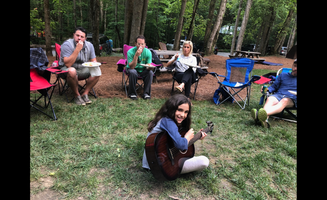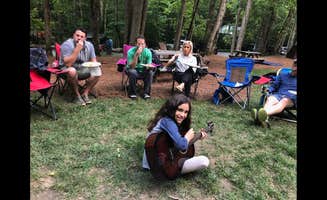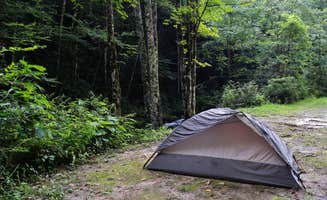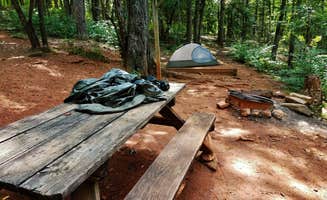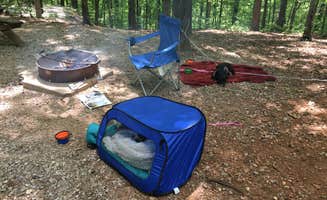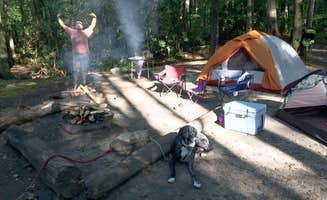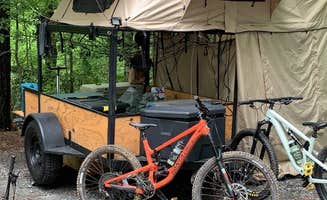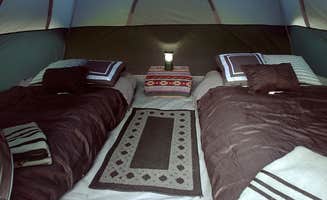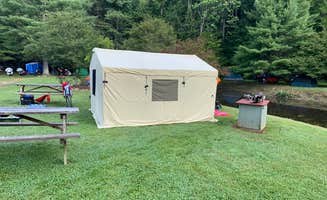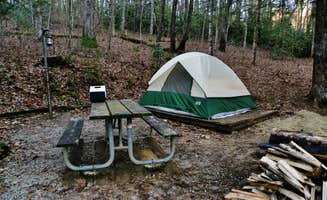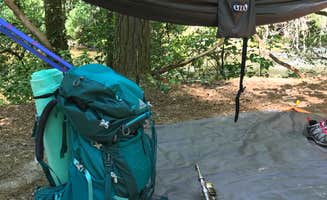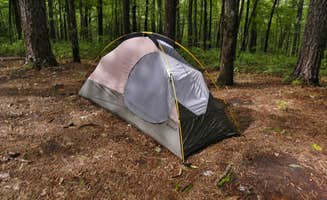Dispersed camping areas in Pisgah National Forest near Rosman, North Carolina provide primitive settings at elevations between 2,100 and 4,000 feet. The forest's mixed hardwood ecosystem creates natural camping pads on forest duff and compacted soil, with many sites situated within 50 feet of streams. Year-round accessibility varies with seasonal road closures on USFS roads during winter months from December through March.
What to do
Waterfall exploration: Access multiple cascades from campsites at Burrells Ford. King Creek Falls requires a half-mile hike from camp on a moderate trail with one log footbridge crossing. "To get to the waterfall, it's best to drive further up the road and park beside the road. There will be a trail sign on the left just past one of the bridges, and the hike is about a half mile or less," notes visitor Myron C.
Trout fishing: Cast in well-stocked mountain streams at designated sites. Burrells Ford offers direct access to the Chattooga River, where SC or GA fishing licenses are valid since the river forms the state boundary. According to Jason D., "Good amount of camping with a short hike in. Sites are right on the Chatooga River. This river is stocked with trout. Fishing license is required but both SC and GA are acceptable as the river is the state line."
Trail connections: Link to long-distance paths from forest camping areas. Multiple campsites connect to the Foothills Trail system. "The trails in the Mountain Bridge Wilderness Area are lovely and accommodate a variety of skill levels," writes Diana C. about Mountain Bridge Wilderness Area Trailside Camping.
What campers like
Secluded sites: Find privacy in dispersed camping areas. At Courthouse 1, tent campers appreciate the solitude of roadside pull-offs. "It is in a great spot, other than being beside the road. There are two fire pits and both places are beside the creek. Since it is primitive camping, there are no facilities, but you get the benefit of being away from people," reports Myron C.
Water sounds: Fall asleep to rushing streams at creekside sites. The sound of water becomes a natural sleep aid at many Rosman area sites. "The site was right on the river and there was a great place to catch some sun on the rocks or rock hop," Laura C. shares about Jones Gap State Park Campground.
Trail access: Wake up next to hiking paths. Many tent sites connect directly to trail systems. "Jones Gap gives you the feeling of really being deep in the Appalachians. The rushing river and dense foliage with tons of mountain laurel makes the air seem so fresh. I love just coming here and hiking upstream and playing in the river," explains John R.
What you should know
Bear safety requirements: Proper food storage mandatory at all sites. Most primitive camping areas provide food hanging systems. "The site featured lantern poles and food hanging systems found at established primitive sites," notes a camper at Mountain Bridge. Another visitor mentioned, "There are bear boxes to protect food and trash to help keep unwanted visitors from troubling guests."
Limited facilities: Prepare for primitive conditions at most sites. At Jocassee Gorges Wildlife Management Area, "There's no water spigots, bathrooms, or amenities other than a fire ring, and cell service is spotty so this is truly a down-to-basics getaway," explains Erica. Plan accordingly with water filtration systems for stream water.
Seasonal road access: Check forest road status before remote camping trips. Many tent camping areas near Rosman require travel on unpaved forest service roads that may close during winter or after heavy rainfall. The Pisgah Ranger District office in Brevard (828-877-3265) provides current road status information.
Tips for camping with families
Gradual backpacking introduction: Start with short hikes. Jones Gap State Park offers walk-in sites with varying distances from parking. "This site (#8) is the closest walk in spot from the Parking area. We were able to hike in a ton of gear (coolers, dog bed, etc.) with a little work and a few trips and it was worth it for the seclusiveness. Having both toddler and dog we knew we couldn't go far but this still felt like we were in the middle of nowhere," shares Laura C.
Stream play opportunities: Select sites with shallow water access. Many campsites feature kid-friendly water features with gradual entry points. "Right on the river and a great place to catch some sun on the rocks or rock hop. There are several hike options right from your site including a nice little waterfall," notes a Jones Gap visitor.
Winter preparation: Pack for significant temperature drops. Rosman area elevations experience winter nighttime temperatures regularly reaching the 20s with occasional dips into single digits. Multiple layers and four-season sleeping bags rated to at least 15°F are recommended for cold weather tent camping with children.
Tips from RVers
Access limitations: Most forest roads restrict larger vehicles. At Blue Ridge Motorcycle Campground, smaller RVs find accommodation, but visitors warn about road conditions: "A small RV or travel trailer MIGHT be able to park here, but be aware of the bumpy gravel road." Most forest camping areas require high-clearance vehicles.
Limited hookups: Bring self-contained systems. Tent camping predominates near Rosman with minimal RV infrastructure. "Lots of opportunities for kayaking, hiking. Not an easy place for first timers to get into. No swim access to the lake. Small campground loop," notes Candy H. about Jocassee Gorges.
Generator restrictions: Check noise policies at each location. Most sites near Rosman prohibit generators to maintain natural soundscapes. Plan for alternative power sources or select developed campgrounds farther from Rosman if power is required.


